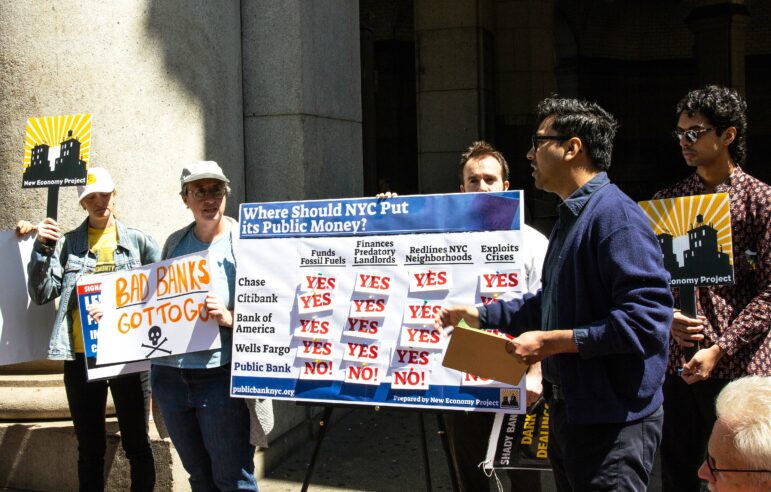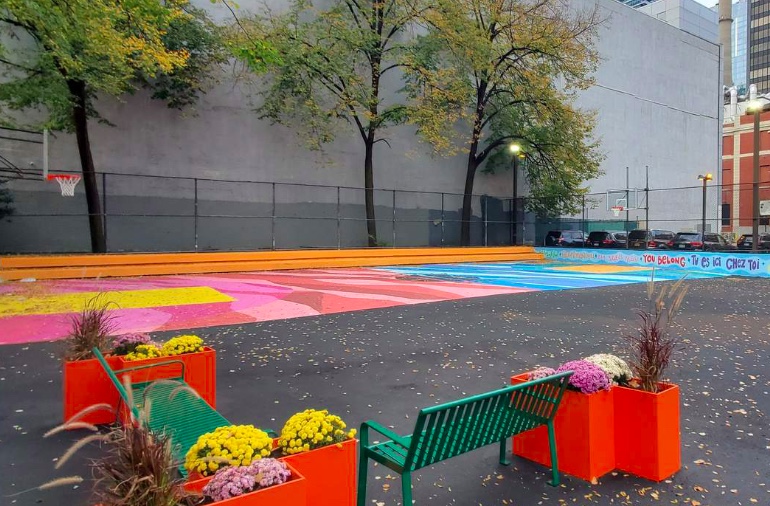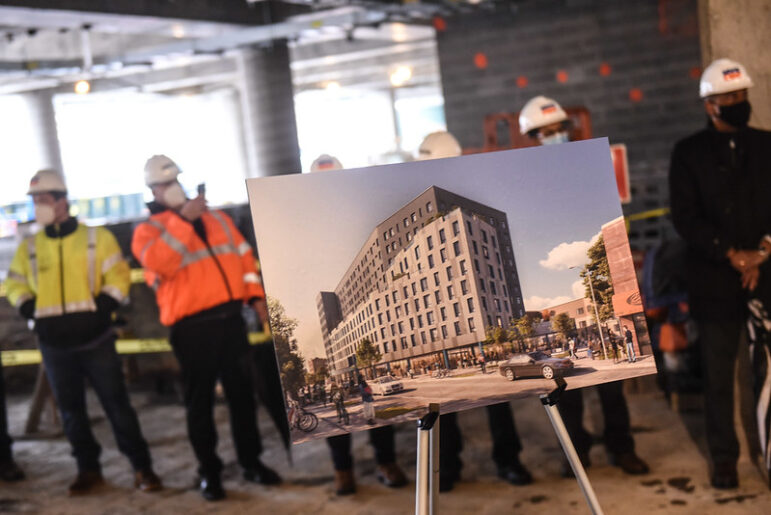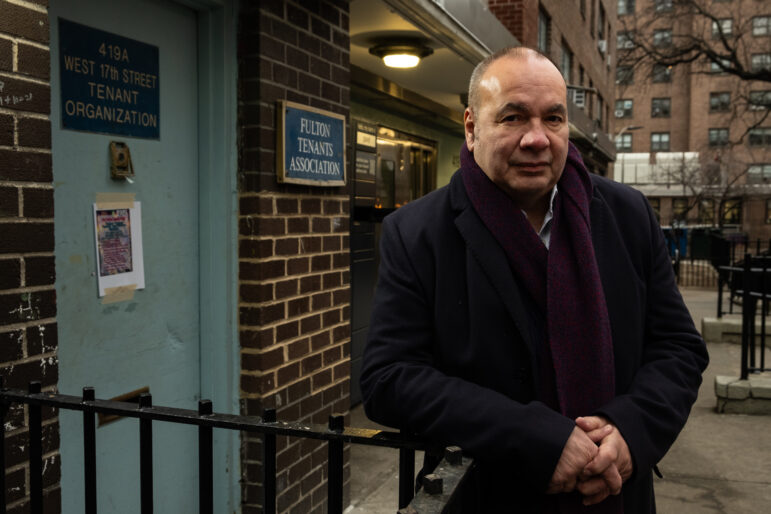
Photo by: Aaron McElroy
An NYPD checkpoint on Broadway near the financial district.
It’s a sweet, blue-sky, New York City day in the summer of 2008. At a Yankees game, spectators in seats by the field will be chained in for the singing of “God Bless America” during the seventh-inning stretch. Visitors to the statue of liberty, once they’ve cleared a long security line, can climb Lady Liberty to the top of the pedestal under her sandals—but not the remaining 110 feet up to her crown. Travelers between lower Manhattan and St. George may board the Staten Island Ferry on foot, but not in their cars. Flyers arriving at JFK airport are banned from using cell phones as they wait for their luggage to appear.
Libraries and Internet service providers may be told by the federal government to produce customers’ usage records and gagged from acknowledging the order. At mosques, a Muslim may wonder—with documented good reason—whether the worshipper next to him is an undercover agent. An activist may wonder the same thing about the marcher by her side. Immigrants may fear raids on their homes or workplaces. New Yorkers phoning other countries could have their calls wiretapped through orders issued by the U.S. attorney general but not approved by a judge.
It used to be that a summer’s day did not include any of these things. In the nearly seven years since terrorists hijacked four planes and killed more than 2,900 people, our society has changed in ways large and small, accepted and resented, acknowledged and overlooked, appreciated and forgotten. The horrific attacks of September 11, 2001, led the Bush administration to declare a “war on terror.” Michael Bloomberg was elected mayor that fall, and since then has presided over a major expansion of the New York Police Department’s domestic and international intelligence-gathering capabilities. Today we go about our lives in ways we would not have predicted, say, 10 summers ago.
Not that we were so innocent then. In the summer of 1998, a man opened fire in the U.S. Capitol and killed two police officers. A teenager in Oregon shot 27 fellow students, and five abortion clinics in Miami were attacked with acid. One of the Oklahoma City bombers was sentenced to life in prison. Pakistan detonated nuclear devices in internationally condemned tests. The mastermind of the 1993 bombing of the World Trade Center, Ramzi Yousef, was sentenced to life plus 240 years in prison. And U.S. embassies in Tanzania and Kenya were bombed, killing or injuring nearly 5,000 people in attacks linked to a largely unknown person named Osama bin Laden. The U.S. bombed locations in Afghanistan and Sudan to retaliate against a largely unknown group called Al Qaeda.
A decade ago, as now, violence was a fact of life in our country and the world. So were debates over human rights, the use of force and the force of law.
But you could wear a backpack into a concert or ball game without thinking twice about it. You could merely nod at the security guard—if there even was one—as you strode through an office building’s lobby. You could wait in a car by the arrivals gate at an airport to pick up the person you loved. You walked the streets of New York City without ever coming face-to-face with a man in combat gear gripping a machine gun.
These were the barely consciously registered hallmarks of a free society.
Nobody thought you might have a bomb.
You were not a suspect.
The warning America issued to itself, in what has become a cliché since September 11, is not to finish the job the terrorists started—not to add insult to the injury of that day by slamming shut our own doors of openness and liberty. And many New Yorkers feel the nation, or at least the city, is once again its robust familiar self, with a great amount of both safety and freedom. They sense no erosion of basic rights—especially because the most fundamental one, to live—is intact. There has not been another attack in America, after all.
Other New Yorkers think the country’s high standards for respecting freedoms have been lowered—that liberty, too, was a casualty of September 11 and the government’s response. They feel the incremental measures taken at every level of society under the rationale of “security” accrue to alter the landscape of what is expected and tolerated, while yielding little additional safety. For them, Benjamin Franklin’s famous words admonish us from across 250 years: “They that can give up essential liberty to obtain a little temporary safety deserve neither liberty nor safety.”
Around the five boroughs, New Yorkers are divided over the freedom they have, what they are willing to give up and what they already may have lost.
Timothy Connors thinks the rights of New Yorkers are well honored. A lawyer, private security consultant and Army reservist, Connors is the director of the Center for Policing Terrorism, which studies how local police departments can best aid in the fight against terrorism. An arm of the conservative Manhattan Institute, the center was born following September 11, after the NYPD asked the institute (which it had consulted before on other policing matters) for expert input on counterterrorism practices. Though not actively working with the NYPD now, the center this spring opened the National Counter-Terrorism Academy in Los Angeles in partnership with the L.A. Police Department.
Connors sees no meaningful infringements on New Yorkers’ freedoms over recent years. “I think for the most part, Americans have gone about their lives since September 11. Sometimes you have some inconvenience like being searched at Yankee Stadium or at the airport. And frankly, how inconvenient is that?” he asks. “It isn’t.” The way to make new laws and policies instituted in the name of security work, he maintains, is by ensuring adequate oversight. Even the controversial USA Patriot Act, signed into law by President Bush on October 26, 2001, to expand law enforcement and intelligence-gathering powers, contains such safeguards, Connors says. “Most people just don’t understand everything that’s in place on that. There’s a lot of oversight in place.”
Connors thinks local and federal counterterrorism ef forts have struck the right balance in protecting freedoms—and that claims to the contrary have distorted public discourse. “There’s been some borderline cases, but I think our system has worked correctly,” he says. “I just believe that the debate has gone to the extremes. There are some things we need to discuss and make sure they [don’t run counter to] our values. But there’s been an attempt to make some of these measures look as bad as they can be made to look. In my view, we’re wasting our time with those debates.”
Like other observers, Connors notes that the country’s response to the terrorist attacks has avoided some mistakes of the past. The 1920 Palmer Raids against immigrants and trade unionists, Senator Joseph McCarthy’s reckless pursuit of Communists in the 1950s and the fBI’s Cointelpro covert investigations of domestic political groups from the ‘50s through the ‘70s are all mentioned as regrettable incidents that post-September 11 America is not repeating.
Arch Puddington, research director for freedom House, a nonprofit institution that surveys human rights and liberties worldwide, agrees on that point. “The Bush administration did not put 100,000 Muslims in concentration camps, the way Roosevelt did with Japanese-Americans,” he says. “The Bush administration did not suspend habeas corpus as was done in the Civil War. And the Bush administration did not wage war against free speech.”
As part of freedom House’s ongoing analysis of freedoms around the world, Puddington recently co-edited a book entitled “Today’s American: How free?” The report was inspired both by the intense and polarized domestic debate over the state of American freedoms in our post-September 11 world and by skepticism his organization encountered internationally. As freedom House staffers traveled abroad in recent years, people in other countries questioned America’s fitness to pass judgment.
By and large, the study found that the United States is a free society, the institutions of democracy function as they should and—”most significant”—that those institutions sustain a “self-correcting democratic system.” In examining the civil liberties implications of counterterrorism policies, however, the book finds much to question about the USA Patriot Act, wiretapping by the National Security Agency, the “extraordinary rendition” program in which foreign nationals may be flown to countries where they face torture, and more. Life has indeed changed in the Bush era, Puddington says. “One of the major criticisms we have of the Bush administration is this arrogation of excessive executive power. What you can’t justify is the secretive nature of the policymaking process.”
Whether this fall’s election yields a President McCain or a President Obama, Puddington is confident that any liberties transgressed out of fears about terrorism will be repaired in the near future. “We fully expect that the post-September 11 problems will be resolved in the next few years,” he says. But the most entrenched threats to our democracy’s health, according to the freedom House book, come from racial injustice, inequality of opportunity and flaws in the political process: “These other problems preceded September 11 and will outlive it,” the book reads.
The very struggle that America has waged with problems like racial injustice reflects an essential reality about this concept of “freedom” that the United States trumpets louder than any nation: Its meaning changes over time. And with human adaptability so great and memories often so short, the present state of freedom can come to seem like the natural one. How many members of Generations X and Y know offhand that until the 20th century, women in this country were not free to vote or use contraception? How many have read that Irish immigrants were excluded from full participation in society along with blacks and Jews? How many are aware that it was unthinkable to elect a Catholic as president?
Conversely, will today’s toddlers grow up to realize, or care, that there was a time when not one school had a metal detector…surveillance cameras and biometric scanners did not track our comings and goings…heavily armed police were not a routine sight around the everyday spaces of New York City…and you could ride a bicycle down Park Row in front of One Police Plaza?
Freedom will keep on evolving. The question is how.
September 11 has been the justification for many of the measures that have altered everyday existence—literally put up roadblocks—in this city. But not all the changes and challenges to freedom have to do with defending against terrorism.
Whether individual, political, economic, artistic, sexual, religious or creative, freedom has drawn souls to New York City from around the world for centuries.
Freedom House didn’t specifically examine the state of freedom here, but Puddington, a resident since 1970, knows it up close. He says that religious, academic and press freedom are all sound in the city, and he notes that the rights of trade unionists are protected better here than practically anywhere in America. In his assessment, the five boroughs get lower marks for the political process—because of de facto one-party rule—and racial inequality, because of the city’s starkly segregated neighborhoods, where minorities face the trials of poverty, crime and poor public schools.
But two things that many New York liberals reflexively wring their hands over are as good as or better here than in other states, Puddington thinks. As in the rest of the country, the criminal justice system disproportionately arrests and incarcerates minority men, but city police actually do deter and solve crimes—which also disproportionately harm minorities. He contends that “New York City cops are probably less hostile, brutal and aggressive than police in a lot of other urban areas,” and that the NYPD’s treatment of minority residents has improved hugely over the years. And, he claims, both documented and undocumented immigrants, including Muslims and South Asians, are on the receiving end of less harassment and hostility in the five boroughs than in much of the country from local government, local law enforcement and fellow citizens.
That may be so. But when it comes to federal agents operating in New York, immigrants’ advocates see a different story—and a creeping mission.
September 11 triggered a series of initiatives directed at Muslim or Arab immigrants—special-interest detentions, so-called “voluntary” interviews, a registration program for Muslim men and boys. Nowadays, however, the immigration debate concerns a far broader swath of noncitizens. Of late, it’s Latino immigrants who are particularly feeling the heat. Agents of the Department of Homeland Security, which now encompasses immigration enforcement, are searching out undocumented residents at their suspected addresses, in actions that advocates say are needlessly intimidating, possibly illegal and unfairly punishing to bystanders as well.
“These things are of a piece,” says Sameer M. Ashar, an associate professor at the CUNY School of Law, where he directs the Immigration and Refugee Rights Clinic. “The home raids on Latinos are part of a pattern of more aggressive enforcement that started after September 11.”
“I think it’s the case that their freedoms have been curtailed significantly,” Ashar says of immigrants. “They are going after immigrants as if they are criminals.”
His concerns go beyond that issue, however. Ashar considers the “If You See Something, Say Something” signs in the subway another reason for fear. They turn neighbors into monitors, he says. “It kind of makes you think it’s there for its own sake. It’s a form of social control.”
Indeed, there’s a difference between measures that make society safer and those that simply make people easier to control—but the generalized threat of terrorism makes the latter more accepted too. Links crop up between changes made in the name of counterterrorism and seemingly unrelated arenas: The NYPD persuaded a judge to reduce protesters’ protections because terrorists could masquerade as a political movement, and Police Commissioner Raymond Kelly has credited some NYPD counterterrorism initiatives with reducing regular crime. The years since September 11 have seen the advent or expansion of a whole spectrum of control techniques, some obvious and others more subtle, whether it’s the proliferation of surveillance cameras, the Transportation Security Administration using trained “behavior detectors” in airports to question nonconformist travelers, the NYPD limiting the number of people who can walk down a street together without a permit or the city requiring employees to clock in to work in the morning by scanning parts of their bodies. These are examples of what some see as recent erosions of civil liberties—which are, in the words of Columbia University historian Eric foner, “rights that individuals can assert against authority.”
Objections to controversial practices are often dismissed with this rationale: If you don’t like that requirement, don’t partake of this service or activity. You don’t have to go to the stadium, ride the subway, fly, take a particular job or join a demonstration. These are voluntary activities (though they add up to just about everything). You could do something else.
You could, for example, stay home. A person’s home has always enjoyed a special place in the law—freedom at home is “the holy grail of privacy under our Constitution,” says J.C. Salyer, a staff attorney at the Arab-American family Support Center in Brooklyn. But new policies are challenging the sanctity of a person’s four walls. Salyer is familiar with immigrants who have been arrested for immigration violations in raids not on workplaces—long-standing targets for immigration agents—but in their homes, a practice that has accelerated since September 11. Ashar from CUNY says that in the metro area, federal agents have entered homes in the predawn hours on the basis of an administrative warrant that applies to one person and requires consent for entry. But the “consent” is unclear at best, and rather than only affecting the one person being sought, other immigrants can be swept up too, he says. This spring, Internet message boards about raids lit up with reports of them in Elmhurst, Queens and Mott Haven in the Bronx.
Private landlords, too, have redefined the rights that immigrants can expect at home—or when looking for places to live. Some refuse to rent to Muslim women who wear veils, according to New York Immigration Coalition Housing Advocacy Coordinator Ericka Stallings. Others demand immigration papers or social security numbers from immigrant tenants before renewing a rent-stabilized lease, in violation of rent-stabilization laws that say a renewal cannot include requirements absent from the original lease.
For longtime New Yorkers as well, the classic American right to be left alone is not necessarily being honored. The federal government has listened to calls without a warrant, sought Web-search histories from Internet service providers and tapped into the massive databases that list the numbers that Americans have called. Technology’s unceasing rise means “there are more and more opportunities for government to intrude into your life, and fewer and fewer protections,” says NYCLU advocacy director Udi Ofer.
Use is spreading of electronic key cards, which have a unique “signature” for each tenant, thus recording when cardholders from particular units come and go. Sue Susman, president of the tenants’ association at Central Park Gardens on the Upper West Side, objects to this—as well as the practice by her landlord of requiring visitors to sign in when they enter. Someone up to no good probably wouldn’t write down his real name, Susman says. “It doesn’t protect us, but it does give the landlord a list of our associates.”
Meanwhile, the New York City Housing Authority—with support from many residents—is expanding its use of surveillance cameras, meant to both deter and collect evidence of crime. And the NYPD has increased its enforcement of anti-trespassing laws in apartment buildings, especially NYCHA properties, via “vertical sweeps,” sometimes arresting people with a reasonable claim to have been visiting a friend, not loitering.
The proliferation of surveillance cameras represents a meaningful intrusion even at home: They record the movements of residents—and their companions—as they come and go. Cameras are so ubiquitous and powerful today that anyone who really wants to be left alone almost has to draw the curtains—bringing the image to mind of poor Winston Smith in George Orwell’s “1984”. Outside the home, the NYPD is stopping and frisking upwards of 400,000 people, the vast majority of them black or Hispanic, per year. Critics claim, but the department denies, that officers use a racial profile to make stops—an allegation that, for some advocates, links the disparate issues of post-September 11 freedom and everyday policing. “Law enforcement continues to rely on racial profiling and other forms of unconstitutional policing methods notwithstanding considerable evidence of their ineffectiveness,” says Johanna Steinberg, a lawyer at the NAACP Legal Defense and Educational fund. “Whether it occurs in the ‘war on drugs’ or the ‘war on terror,’ such misguided priorities only serve to undermine relationships with community members and, as a result, deter them from cooperating with police officers.”
The most dramatic challenges to traditional American freedoms are not playing out in New York City’s streets, subways or homes, but in courtrooms and military prisons well beyond the boroughs. Through the combined provisions of the Detainee Treatment Act of 2005, the Military Commissions Act of 2006 and the president’s use of the “unlawful enemy combatant” designation, an American citizen could be removed from his home by the government for offenses that are never articulated, and held indefinitely without charge and with minimal access to counsel. The odds of this happening to any one person are minuscule (and were reduced further by a Supreme Court ruling in June). Yet, says Rep. Jerrold Nadler, the implications of the practice have been profound—and they ripple through federal law, court cases, municipal policy and local policing; they echo in our streets, schools and workplaces.
“It means the government can do anything. You can’t hold them accountable,” says the eight-term Democrat, who represents parts of Manhattan and Brooklyn and chairs the House Judiciary Committee’s Constitution, Civil Rights and Civil Liberties subcommittee. Nadler sees the Bush administration’s encroachments as repeating “a familiar pattern,” he says, referring to America’s periodic restriction of rights in response to security threats. “We usually end up embarrassed and apologize for it 30 years later.”
In response to Bush’s “absolutely terrible” record on civil liberties, the congressman has introduced a handful of bills into the House intended to be remedies: the Restoring the Constitution Act of 2007, which repeals some provisions of the Military Commissions Act in order to narrow the definition of “unlawful enemy combatant” and raise evidentiary standards in military commissions, among other things; the Habeas Corpus Restoration Act of 2007, which would again allow federal courts to consider applications for writs of habeas corpus filed by people designated by the president as “unlawful enemy combatants”; the National Security Letters Reform Act of 2007, which tightens the conditions under which the FBI or another agency can issue a letter soliciting information about a citizen; and the State Secret Protection Act of 2008, which requires increased judicial review of the government’s invocation of the state secrets privilege.
Nadler concedes that none of his legislation has any chance of succeeding as long as Bush must sign it to become law. But, he says, “Hopefully next year we’ll have a president who doesn’t think you have to be a totalitarian government to fight terrorism.”
for the time being, there’s no doubt that on this summer day, some New Yorkers are waging their own battles for liberty. The contests may not be glamorous and may have little to do with September 11. But in their contestants’ eyes, they are about freedom.
When a new building manager removed the long-lived bulletin board at 5 West 91st Street that neighbors used to communicate about everything from housing issues to block parties to job openings, tenant association president Nikki Springer wasn’t going to stand for it. “People are just afraid to speak out, because landlords are so powerful,” Springer says. She felt her own rights and those of her fellow residents were being infringed on—and complained to both the landlord and her elected officials until the bulletin board went back up (the offending manager was replaced too). “People do not want to take a risk, because they’re afraid of what the landlord will do to them,” she says. But “it’s a bulletin board today, and what’s it going to be tomorrow?”
Others are more theatrical—and deliberately so—-in their efforts, like Billy Talen, who has been fighting for a decade now. Coming from a background in theater, he initiated his role as Reverend Billy, leader of the Church of Stop Shopping, in 1998 as a novel way to redirect New Yorkers’ attention from consumerism to civic engagement. Playing that part, he makes noise on the streets of the city with a white megaphone to match his white televangelist’s suit, employing the first Amendment as his permit. He’s been arrested many times both here and in cities abroad, but only once (at Union Square in June 2007) while actually reciting those first 45 words of the Bill of Rights.
“My experience with public space as a sidewalk preacher was that it was contested space,” Talen says. But he welcomes the confrontation, especially in his current battle to remake the pavilion at Union Square—a park that’s been an important space for protest, both historically and in the present—into a shrine to free expression rather than a new-and-improved restaurant per Mayor Bloomberg’s plan. “Confrontation within contested space is one of the most basic American impulses.”
Not that he objects to moments without conflict. As Talen looks back over his decade of activism, the purest such time rings clear. It was the weeks after September 11, when throngs were drawn to Union Square as if by instinct, in a mass mourning that took the shape of tears, hugs, making art, even getting married. “The police didn’t dare interrupt us,” Talen says. “That is where the first Amendment was working.”








